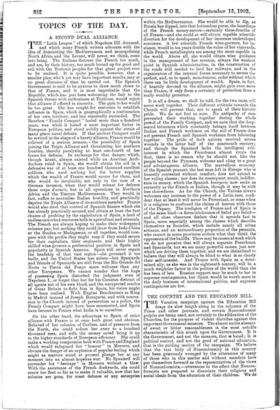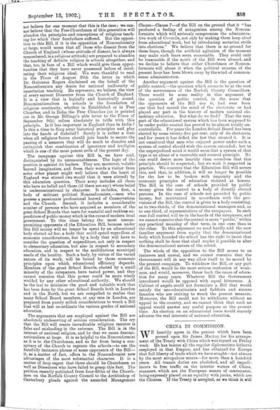THE COUNTRY AND THE EDUCATION BILL.
THE Vacation campaign against the Education Bill drags its slow length along in the columns of the Timm and other journals, and certain Nonconformist pulpits are being used, not certainly to the edification of the Churches, for the purpose of violent diatribes against this important Government measure. The almost entire absence of sweet or bitter reasonableness is the most notable characteristic of this attack upon the Government. It is the Government, and not the measure, that is hated ; it is political control, and not the good of national education, that is the guiding motive of the campaign. We believe that the vast body of Nonconformity in this country has been grievously wronged by the utterances of many of those who in this matter and without mandate have put themselves forward as the representatives of the views of Nonconformists,—utterances to the effect that Noncon- formists are prepared to dissociate their religious and social ideals from the education of their children. We do na believe for one moment that this is the case ; we can- not believe that the Free Churchmen of this generation will abandon the principles and conceptions of religious teach- ing for which their forefathers suffered. But the opposi- tion to this Bill, if it is the opposition of Nonconformity at large, would mean that all those who dissent from the Church of England (whose attitude of dissent, be it always remembered, is a religious attitude) are prepared to abandon the teaching of definite religion in schools altogether, and that, too, in face of a Bill which would give them oppor- tunities that they have never possessed before of incul- cating their religious ideal. We were thankful to read in the Times of August 30th the letter in which Dr. Guinness Rogers disclaimed on the behalf of the Nonconformists any desire for national uniformity of unsectarian teaching. He represents, we believe, the view of every earnest Dissenter from the Church of England. It is a view that is logically and historically sound. Denominationalism in schools is the foundation of religious continuity, whether in Established or in Free Churches, and in India the Free Churches (as is pointed out in Mr. George Billings's able letter to the Times of September 9th) refuse absolutely to trifle with this principle. Is it less important in England than in India ? Is this a time to fling away historical principles and play into the hands of disbelief ? Surely it is rather a time when all religious forces should join hands to secure the passing of a measure that will do much to dissolve and extinguish that combination of ignorance and irreligion which is one of the most potent evils of the present day. The campaign against this Bill is, we have said, distinguished by its unreasonableness. The logic of the position is against its leaders. They are, moreover, voluble beyond imagination, and from their words a visitor from some other planet might well believe that the heart of England was stirred (we would that it were stirred) by this education question. Their army includes all those who have no belief and those (if there are any) whose belief is undenominational in character. It includes, first, a body of militant political Nonconformists,—men who possess a passionate professional hatred of Conservatism and the Church. Second, it includes a considerable number of persons who have acquired as members of the great School Boards that taste for wasteful and reckless ex- penditure of public money which is the curse of modern local government. To this class belong the most uncom- promising opponents of the Education Bill, because under this Bill money will no longer be spent by an educational body elected ad hoe, a body that could spend regardless of economic considerations, but by a body that will have to consider the question of expenditure, not only in respect to elementary education, but also in respect to secondary education, and in respect to the multifarious municipal needs of the locality. Such a body, by virtue of the varied nature of its work, will be bound by those economic principles upon which educational efficiency depends. Members of the great School Boards, elected by a small minority of the ratepayers, have tasted power, and they cannot conceive that this power could be more wisely wielded by any other educational authority. We should be the last to minimise the good and valuable work that has been done by the great School Boards both in London and in the North, but we are compelled to realise that many School Board members, at any rate in London, are prepared from purely selfish considerations to wreck a Bill that will at last co-ordinate the various grades of national education.
The arguments that are employed against the Bill are absolutely undeserving of serious consideration. The cry that the Bill will create ineradicable religious rancour is false and misleading in the extreme. The Bill is in the interest of national religion, and by that we mean denomi- nationalism at large. It is as helpful to the Nonconformist as.it IS to the Churchman, and so far from being a, con- spiracy of the Church to capture the schools—to use the hatefully insincere phrase of some opponents of the Bin- d, as a matter of fact, offers to the Nonconformist new advantages of the most substantial character. It is a matter of deep regret that there should be Churchmen as well as Dissenters who have failed to grasp this fact. The petition recently published from four-fifths of the Church- men on the Norfolk County Council to the Archbishop of Canterbury pleads against the amended Management Clause—Clause 7—of the Bill on the ground that it "has produced a feeling of antagonism among the Noncon- formists which will seriously compromise the administra- tive work of Councils, not only by making them keep aloof from educational work, but by introducing sectarian strife into elections." We believe that there is no ground for these fears, though the artificial agitation of the moment may make such fears seem reasonable. They could only be reasonable if the spirit of the Bill were abused, and we decline to believe that either Churchmen or Noncon- formists will abuse it when the political miasma of the present hour has been blown away by the wind of common- sense administration.
Another argument against the Bill is the question of public control,—the question which seems to be at the root of the nervousness of the Norfolk County Councillors. There would be some reality in this argument if the question of public control, in the sense that the opponents of the Bill use it, had ever been one that had moved the mind of the electorate or had played any part in the history of modern national ele- mentary education. But what do we find ? That the very part of the educational system which has been supposed to be under public control has proved to be almost totally un- controllable. For years the London School Board has been elected by some twenty-five per cent. only of its electorate, and for years it has defied the law that created it. It is not unnatural that men who enjoyed power under such a system of control should wish the system extended ; but to the unprejudiced mind it would seem that a system of that type is an abuse of a venerable and revered principle. No one could desire more heartily than ourselves that this principle should be respected ; but we wish it respected in practice. We conceive that the Education Bill will secure this, and that, in addition, it will no longer be possible for the law to be broken with impunity and the economic principles of education violated at leisure. The Bill in the case of schools provided by public money gives the control to a, body of directly elected persons. In the case of schools not provided by public money, but maintained in accordance with the pro- visions of the Bill, the control is given to a body consisting, as to two-thirds, of the denominational managers and, as to one-third, of representatives of the ratepayers. In each case full control will be in the hands of the ratepayers, and we cannot conceive that the control is more "public," within any practical meaning of that term, in one case than in the other. To this argument we need hardly add the now familiar argument from equity that the denominational body which founded the school has the right to insist that nothing shall be done that shall render it possible to alter the denominational nature of the school.
The whole of the opposition to the Bill seems to us insincere and unreal, and we cannot conceive that the Government will in any way allow itself to be moved by the present campaign. To withdraw the Bill, or any part of the Bill, would be the most serious confession of weak- ness, and would, moreover, throw back the cause of educa- tion for many years. Whatever Bill the Government introduced would be opposed with equal bitterness. A Cabinet of angels could not formulate a Bill that would satisfy the neo-educationists and faddists and sincere fanatics who are striving to wreck the present measure. Moreover, the Bill could not be withdrawn without an appeal to the country, and we cannot think that such an appeal would answer any useful purpose at the present time. An election on an educational issue would scarcely advance the real interests of national education.







































 Previous page
Previous page